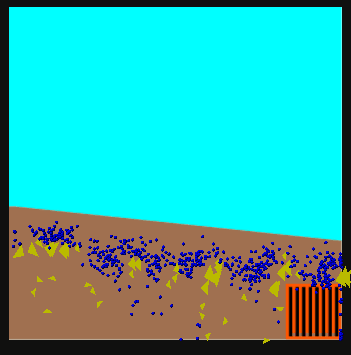Lorianne Flaherty, Valentina Romero-Moran, Kaylee Bertrand concept from their proposal Auer Avenue School
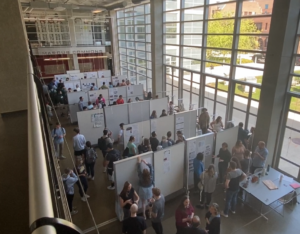 This spring our collaboration with UWM’s School of Architecture & Urban Planning (SARUP) and Center for Student Experience and Talent placed 128 architecture students in service learning roles in 15 Milwaukee and area schools. These students were enrolled in Arch 302, Architecture and Human Behavior, and the focus of their course work was the design of learning spaces. Over the course of the semester, each UWM student provided 20 hours of support to a classroom teacher, most often working directly with students. This provided a unique way to get a sense of both how the learning spaces they were in functioned, and view of what the school experience is like for both teachers and students.
This spring our collaboration with UWM’s School of Architecture & Urban Planning (SARUP) and Center for Student Experience and Talent placed 128 architecture students in service learning roles in 15 Milwaukee and area schools. These students were enrolled in Arch 302, Architecture and Human Behavior, and the focus of their course work was the design of learning spaces. Over the course of the semester, each UWM student provided 20 hours of support to a classroom teacher, most often working directly with students. This provided a unique way to get a sense of both how the learning spaces they were in functioned, and view of what the school experience is like for both teachers and students.
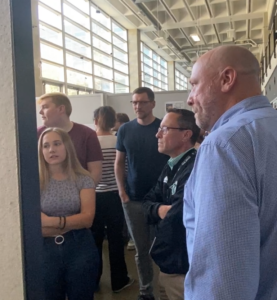 UWM students used their service learning experience to identify spaces that could better support students and teachers. Working in teams of 2 to 4, the UWM students spent additional time in the school to interview students, teachers, and staff about the spaces they used. From that, the teams developed design proposals to address issues of concern or opportunities to tailor the space to better meet the needs of users. That work was shared in a public presentation at SARUP, and with each participating school.
UWM students used their service learning experience to identify spaces that could better support students and teachers. Working in teams of 2 to 4, the UWM students spent additional time in the school to interview students, teachers, and staff about the spaces they used. From that, the teams developed design proposals to address issues of concern or opportunities to tailor the space to better meet the needs of users. That work was shared in a public presentation at SARUP, and with each participating school.
The bigger story here is the exposure this created for the School of Architecture. Across the 15 schools, some 2,500 K12 students had regular opportunities to interact with UWM Architecture students, learn who they are as individuals and what motivates their work. This is the broad end of a funnel to develop and recruit talent not just for UWM, but for the industry. Given the demographics of the schools involved, where 3/4 of the students are non-white and 2/3 economically disadvantaged, it’s also a funnel aimed at groups that are underrepresented in the field.
Given the overwhelming positive response from both UWM students and the schools they served, we’ll continue the collaboration over the coming school year with some expanded opportunities for participating schools. As part of our STEM Studio Workshops this summer, we’ll be working with K-12 educators, UWM, and industry partners to develop a design challenge for middle and high school students focused on space within their school. Arch 302 students will be available in the spring semester to serve as near peer mentors for K-12 students engaged in that work. We’ll be lining up additional support and on-campus experiences to support the work of students and teachers participating in the project.

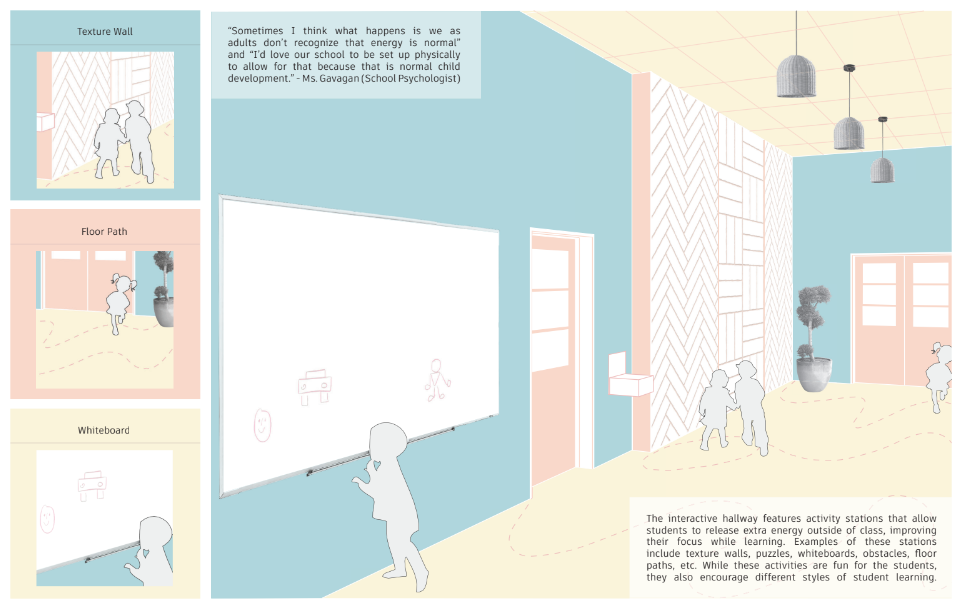
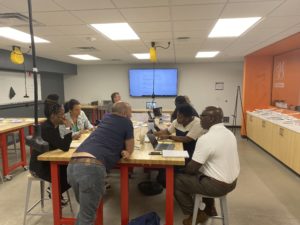 The STEM Studio sessions for our Learn Deep Fellows kicked off today at MSOE. Over this week and next our Fellows will work together with input and support from community partners to design of real-word challenges focused on water. Today’s work began with a focus on goals Fellows have for the program. Through repeated cycles of asking “Why?” we saw those goals grow from tactical hopes for the skills students or teachers might development to visions our Fellows have for their students — that they can see themselves as creators, citizens, individuals who can make a difference in their community. We’ll use those much loftier goals drive the vision for projects knowing that we can hit the initial, tactical ambitions along the way.
The STEM Studio sessions for our Learn Deep Fellows kicked off today at MSOE. Over this week and next our Fellows will work together with input and support from community partners to design of real-word challenges focused on water. Today’s work began with a focus on goals Fellows have for the program. Through repeated cycles of asking “Why?” we saw those goals grow from tactical hopes for the skills students or teachers might development to visions our Fellows have for their students — that they can see themselves as creators, citizens, individuals who can make a difference in their community. We’ll use those much loftier goals drive the vision for projects knowing that we can hit the initial, tactical ambitions along the way.